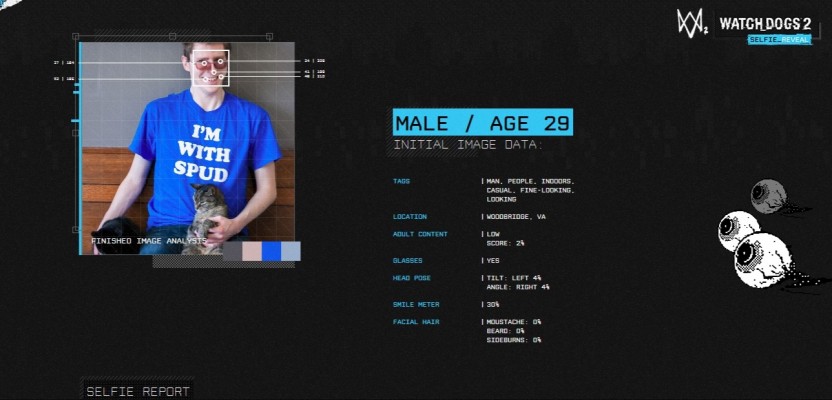Every day, millions of selfies are posted and shared, without a thought given to the risks they may pose, with advances in technology turning every camera and every selfie into a potential data mine ripe for hackers to excavate. To capitalise on this phenomenon, and promote their upcoming hacker-themed open-world action game, Watch Dogs 2, Ubisoft have tapped AKQA to launch a very unique campaign, which exposes the hidden dangers of the perpetual selfie.
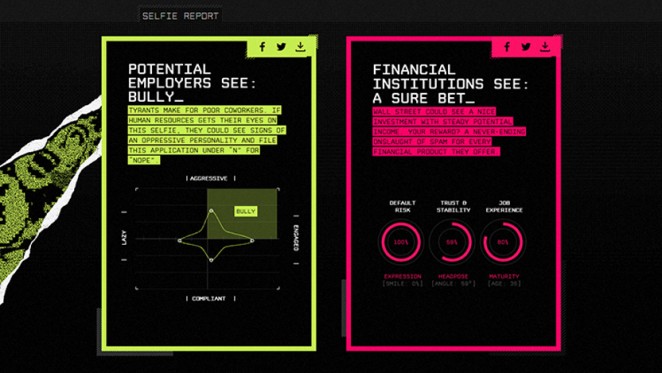
Watch Dogs 2: Selfie Reveal allows viewers to upload pictures they've shared on social media to understand what data (such as their location) can be gleaned from their pics. The initiative, which is being pushed by digital ads on Facebook, Twitter and other channels, is a first-of-its-kind digital experience that uses cutting edge technology to uncover the risks of seemingly innocent selfies by detecting the image content of your photo through multiple image analysis APIs, and then demonstrating how hackers, companies, or even the government could use the data to harm you. This platform can recognise your expressions, body language, location, and other objects in the photo that a proprietary algorithm uses to draw hypothetical conclusions that are displayed back to you.
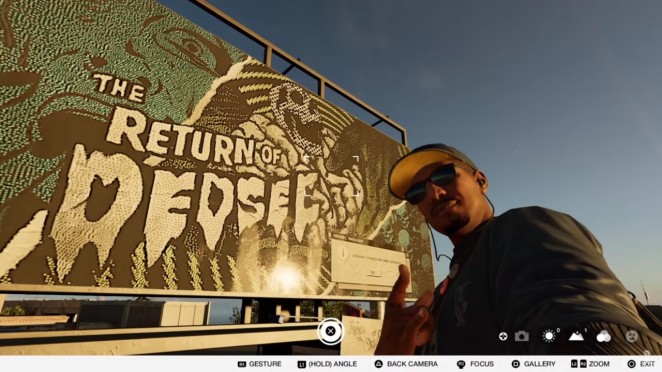
David Maynor, Creative Consultant on Hacker Tools, Techniques, and Culture for Watch Dogs 2, said: “Selfies do not just convey the information your naked eye can see, but the image may contain metadata including additional details about you or where the picture was taken. Selfie-takers rarely give their background much thought, which can lead to unintentionally sharing of information. This affects not only the selfie-taker but anyone caught in the background. All that is required for inclusion in a facial recognition database is a selfie. Selfies could be thought of as taking your own mug shot in this regard. These pictures can be mined for behaviour and lifestyle indicators over time. As a hypothetical example, can you imagine getting an email from your healthcare provider where they noticed you have gained weight by comparing a series of selfies over the last year and as a result your premiums are going up?”
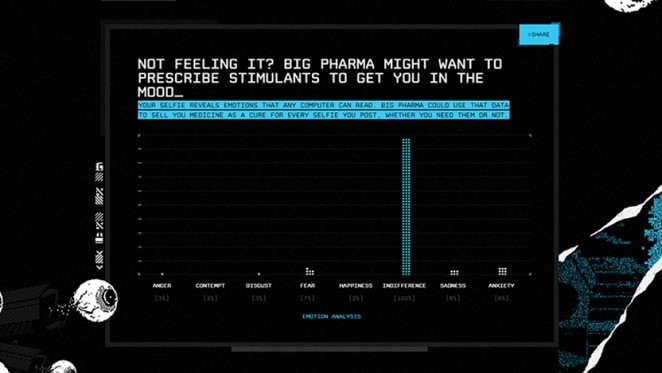
Benji Han, Brand Manager at Ubisoft, has said that his team didn't just want to promote the game, but also wanted to “Push the conversation about technology and hacking.” Jefferson Liu, Creative Director at AKQA, added: “It was certainly fun to take darker view than most digital marketing you see today. We've been conditioned to believe that the internet of things and big data are shiny, aspirational concepts.”
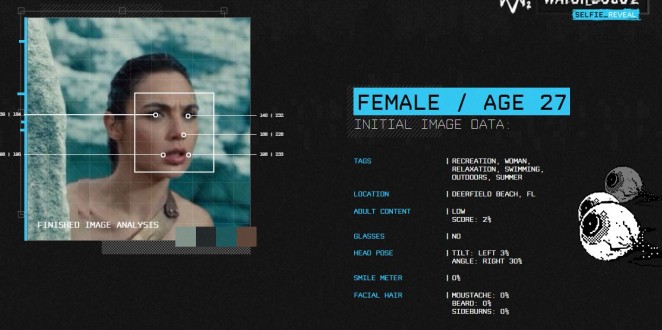
To produce the microsite's results, Selfie Reveal utilises a healthy dose of machine learning and artificial intelligence. The Selfie Reveal engine uses a powerful platform to detect the image content of your selfie, then demonstrates how corporations, governments, and hackers could use this data against you. This platform can recognise your expressions, body language, facial details, location, emotional state and other physical objects in the photo that a proprietary algorithm uses to draw hypothetical conclusions that are displayed to the user. Ed Davis, Senior Account Director at AKQA, explained that artificial intelligence is now a strong focus for the agency. He said: “AI can help bridge the gap between brands and their audiences, connecting them in direct and practical ways. By bringing people together and addressing their needs through AI, we hope to create experiences, products and services that add value for everyone.”
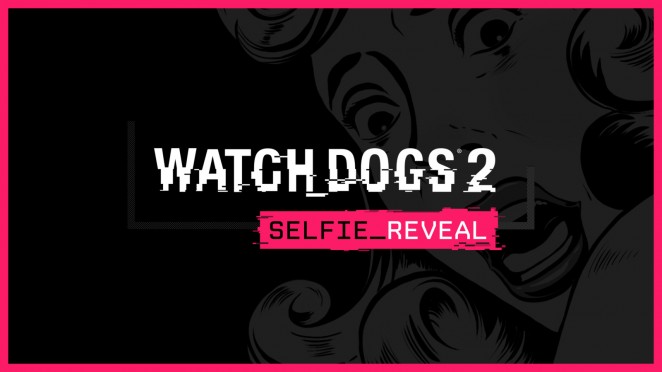
The operation of the site itself is rather clever. The site runs a selfie (or any photo) through artificial intelligence processors that can recognise certain objects and information contained in photos. The site then uses this information by running it through custom algorithms and comparing it against publicly available databases to draw possible conclusions that are displayed to the user. The site will only make an informed guess about what’s depicted in the photograph from what the AI applications recognise and any meta data that may the photo may contain (such as capture location IP address, etc). All this information exists in almost every single digital photo. The level of confidence in the accuracy of these AI applications is unpredictable and solely dependent on the quality of the uploaded photo and the machine learning technology powering those API’s, which are always evolving.
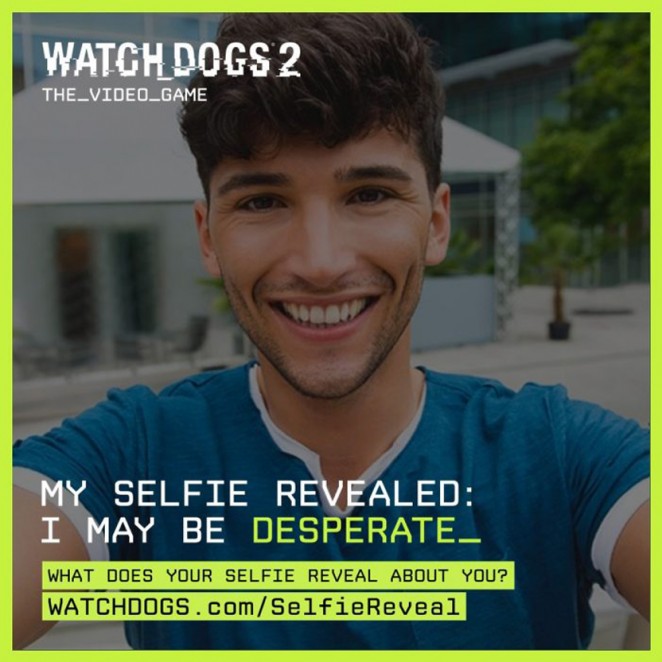
If this all sounds a little terrifying (and it should), you can sleep soundly in the knowledge that the site is simply for entertainment (and promotional) purposes, and will not share your date with any third parties besides the developer of the AI and Ubisoft. If nothing else, it might make you pause for thought and seriously consider the implications before you decide to share your next selfie on Instagram.


